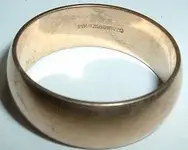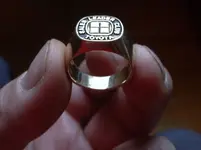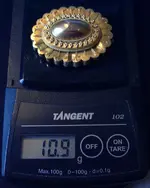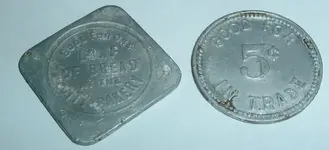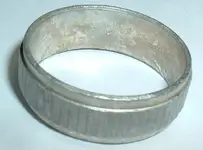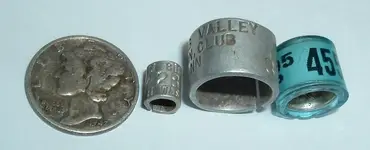Hi, Tom.
Thanks for the humor and your patience with me. It get's busy with family obligations this time of year. We enjoyed a nice dinner followed by some drinking and dancing late into the night. You might have been with us while I was at times alone at the table, thinking occasionally of our conversation here.

You’re really making me think. I appreciate that because I want to ensure that I am truthful to what I’ve experienced. I hope I do not mislead anyone with a poor choice of words. I do not claim any special knowledge unavailable to anyone else. It’s true there are no tricks except tricks. In metal detecting I only care about enjoyment and results. I enjoy the hunt more than the find. I find I want results that are pleasing.
A. Now we’re down to the human factor it would seem. The psychological element.
I know exactly what you’re talking about. The various biases we humans tend to exhibit are difficult to identify in ourselves and easy to identify in others. We might even think we are immune from certain bias, and that is the blind spot bias. You and I both have many biases. Anyone who thinks has biases. I’m not going to enumerate them, as there are many, and a disagreement between us on any subject is rooted in them, but I want to address the most critical aspect of the subject for our purposes – cognitive bias requires thought.
Thought requires words. Words are merely labels. On their own words have no reality and are merely vibrations. We interpret the squawks and grunts we humans make as words, assuming that we understand the language; otherwise sound remains unintelligible vibrations that strike our ears. This is all a very quick summary to get us on the same page, so to speak. Please bear with me as I seem to stray with a simple explanation directly from my life experience.
I practice Zen. Long before I purchased my first metal detector I was practicing Zen. Among the ignorant, Zen in practice is often thought of as a religion, and I suppose there are aspects that seem that way due to the rituals, and some people may attempt to incorporate it into their existing religious practices, but in essence, it’s not mystical or religious, it’s experiential. It is the religion of no religion. Zen isn’t concerned with beliefs, except how to drop them.
One major part of Zen practice is the cessation of our thoughts; to get to and remain in a place before words can form. No judgment, no expectations, no words.
This isn’t the place to get deep into Zen, nor do I wish to, or can I even do so via words, but I mention it only because it’s linked, and I know the importance of having the right state of mind. The right mind washing dishes, or the right mind in combat, or the right mind in competition, the right mind in any activity we do if we want to perform and be our best. That right mind is called the observing mind.
Yes, you have two minds.
EXERCISE FOR PROOF
It is known that people that meditate have different brain activity and more brain activity in certain areas than those who do not meditate. Even those new to meditation , and in very short time periods, show increased neural activity in regions of the brain that were essentially dormant, or had shown little activity before. Science has recently been discovering what Zen practitioners (and other meditators) have always known, there is something to it… it’s not just some Woo BS. I understand (saw it on TV news program) that the USMC has recently been embracing and encouraging a Zen style meditation for soldiers…because there are results! Undeniable results according to those soldiers who practice. Western psychology has begun embracing what was long practiced in the East, although for different goals. Even though the mechanism is not well understood scientifically, the results are easily verifiable by anyone without severe brain injury.
Skeptic? It’s easy to try out on yourself and it’s not going to hurt you…well, perhaps your ego. At worst it may seem to waste your time. It’s so easy it’s extremely difficult.
So, let me describe, if I am even able to communicate it, what that mind is like for me while metal detecting, mentally prepared for peak performance, and searching for gold at the top of my game. I cannot maintain this mental state continually while detecting, but fortunately, to see results one does not have to.
Perhaps there was a time you were listening to music you’ve never heard before, and if you haven’t listened to it all, Antonio Vivaldi’s
The Four Seasons is one of my favorites. Anyway, the best way to listen to music is to stop thinking about everything but the sound coming into your ears at the moment it strikes your eardrum.…no, actually, don’t even think about sound, just hear. Shut off the brain chatter, if one can, and hear completely with a silent, non-judging mind. Listening is active, hearing is passive. HEAR! It’s an important distinction that needs to be emphasized. HEAR!
This is the part of the state of mind I wish to maintain as long as I am sweeping the coil. While searching or investigating with multiple coil sweeps and angles, I still try to maintain this state. Do I always maintain this every moment I am searching? Hell, no. Just like everyone else I have random thoughts like, “did I take meat out of the freezer for tomorrow?”, or "I need to pee", but I’ll immediately recognize this from practice and then guide my mind back to stillness, just observing. If you do not control your thinking mind your efforts will be more difficult. If you have no tradition, no experience, or practice in learning to control your mind, then this is difficult to do, but it is not impossible! Just like a bodybuilder lifts weights to build his muscles, various meditations build “muscles” of the mind. Again, this is something a reader is free to confirm for themselves. Science confirms it. Your own experience can confirm it too
When I get a tone that causes me to think, I’ll tend to dig it. Usually the thought is a quick one like, “odd”, or “different”. Sometimes it may be a familiar tone and my experience triggers a thought of "penny". It’s similar to how if you listen to a familiar song you’ve heard a million times, and should one, two, or three notes get distorted, or off key you immediately would notice. That is the kind of difference I want to hear. Not in a negative aspect, more a positive aspect when the coil passes over gold. When many of the notes (trash) sound similar, like a badly recorded record, then when a clear note appears it’s very evident.
So, I had to think and reflect before posting again so I can continue to challenge my own experience. If I get a tone, there can’t really be bias until I associate a word to the tone. Without thought a tone is simply vibrations striking my ear. With many similar vibrations striking my ear, when a good one, or should I say an unusual tone appears out of the ordinary, it is at that exact point I begin to think. Often, when it’s safe to do so, I literally will close my eyes and slowly walk a line, swinging while hearing what is playing in my ears. I’m hearing all the birds of a forest at once. This is one aspect of increasing success identifying gold jewelry I consider very key, and I could devote 10,000 more meaningless words to it without effort.
That’s probably the best I can answer you without being face to face. I talk faster than I type, unfortunately, and this could be a book.
B. The instrument tests
To me these tests are not so much important to prove what I am hearing, but to prove that the signal the machine sends to your headphones is not consistent for the same tone across multiple materials. It’s also tends to illustrate that resolution is somewhat important.
It simply leaves (or had left) me with a question. If one tone has two slightly varying responses, can one hear it?
Perhaps that depends on the resolution of a listener’s ear. That's the only need for equipment other than our ears. To assist in reaching a common baseline.
I don’t have time at the moment to get into C. My kids are begging me for a Nerf war… duty is calling.

I am formulating thoughts to get to it soon. I’ll address your issues within C. by briefly mentioning statistics, probability, and game theory - because that’s what works too.
Until then keep your ears to the ground, and I look forward to any response you may have.






